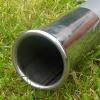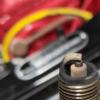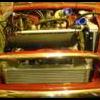I asked this question over on www.mig-welding.co.uk and one chap mentioned Legionnaires disease, although I believe jokingly but now my mind is running away with itself (I've got obsessive compulsive disorder to blame for that). The compressor may well have been sat with a small amount of water in the tank for a long time.

Air Compressor Safe To Use?
#1

Posted 26 October 2016 - 11:29 AM
I asked this question over on www.mig-welding.co.uk and one chap mentioned Legionnaires disease, although I believe jokingly but now my mind is running away with itself (I've got obsessive compulsive disorder to blame for that). The compressor may well have been sat with a small amount of water in the tank for a long time.
#2

Posted 26 October 2016 - 11:52 AM
Only advice I can give is drain the tank (there should be a valve or bolt attached to the bottom/side of the tank) to relieve it of any water that might have gotten in there.... leave it to drain for a good couple of days...
Plug it in and start it up on the lowest possible pressure setting you can...
If it starts up, compresses the air and then stops (as it should) then happy days, just make sure the water trap is empty...
Personally (im a bit GunGho) Id plug it in and see if it stops when it should then completely empty it of all air, then repeat a couple of times..... but do it in a back garden, otherwise if it leaks or blows a seal, its unlikely to take your house with it... Theres a lot of energy stored in compressed air tanks, when they let-go they are quite spectacular....
#3

Posted 26 October 2016 - 01:28 PM
to be honest with you unless it was under 2 feet of water or floating round I doubt you will have an issue. Might be worth swapping the oil, will tell you if water has got into the cylinder.
Id take it into the back yard and see if it pressurises.
#4

Posted 26 October 2016 - 01:35 PM
What I would do is plug it in to a socket with an RCD (residual current device) which all outside sockets so garages and sheds should have (usually fitted in the consumer unit). Run it with the drain valve open to clear any water from the tank, then it all seems well give it a go. If it has shorted internally due to corrosion the RCD will trip before you get a shock. Also if it does all work well you want to get a inline filter with a water trap to stop you spraying the cavity wax in with moist air. As compressed air does attract water.
#5

Posted 26 October 2016 - 03:05 PM
Thanks for the responses guys.
I don't have any concerns about the electrical aspect of the compressor. In fact I'm 99% certain that the electrical and mechanical components of it are fine although I will be checking the tank to make sure it's not rusted internally or anything as it's more than ten years old at this point.
My concerns are more surrounding the fact that it was in a horrible environment, close to sewerage and whether or not I need to worry about any bacteria/viruses/spores or anything that I might be blowing around the garage and inhaling while I'm working.
I'm going to give the thing a good going over to make sure everything is alright and as part of that I'm tempted to disconnect the tank completely, drain it (if anything is in there) and give it a swill out with boiling water and fairly liquid before rinsing it out thoroughly and then letting it dry for a few days open before I use it. Is that enough though or should I just be replacing the thing?
#6

Posted 26 October 2016 - 03:20 PM
It'll be taking in fresh air pressurising it and blowing it back out - as long as that air can't pick anything up en route then there should be no issue. By the time you've filled and emptied the tank two or three times you'll have purged it out (maybe do this outside first if you're concerned).
Is there a filter on the air intake? Give that a good clean/sterilisation and then I would say you were good to go with your other cleaning too.
#7

Posted 26 October 2016 - 04:10 PM
I recently got a similar compressor for a tenner from an auto jumble. My first concern was the condition of the safety valve. You should be able to pull it open just to make sure it is not corroded up. Then there is the pressure control valve. I took off the cover again looking for corrosion. I was able to lever it open a bit and it seemed OK. I adjusted it to a very low pressure then plugged it and switched on. It went off to pressure and switched off, so ok. I then emptied it through the valve underneath to blow out the water, which was very little, turned up the pressure and blew it up again a few times, adjusting the pressure each time. It works fine. I now have two compressors which I am toying with the idea of linking together.
Edited by greenwheels, 26 October 2016 - 06:32 PM.
#8

Posted 26 October 2016 - 04:14 PM
I'd plug it in and just let it get on with it. Compressed air gets very hot under compression so any bacteria would prob be killed there. The inside of the tank will prob be damp and oily, so again I wouldn't worry about legionella.
As for the tank being rusty internally, it will become porous and just leak rather than go bang.
Just plug it in, it'll be fine
#9

Posted 26 October 2016 - 04:29 PM
Also I would be concerned about the accuracy of the gauges.
#10

Posted 26 October 2016 - 04:40 PM
Let us know how you get on. Good luck 🙂
#11

Posted 26 October 2016 - 05:20 PM
Don't be a girl!!
It's fine!!
It's not as though you're going to use it for breathing apparatus or anything like that.
Compressor tanks are used to a bit of water, there will be a filter in the regulator unit and this might need cleaning.
Otherwise, if it doesn't blow up then you're good to go.
#12

Posted 28 October 2016 - 06:48 AM
Go talk to your local GP Doctor about any potential health risks you are suspect of.
#13

Posted 28 October 2016 - 07:08 AM
Don't use fairy liquid.
If you want to use anything use a bit of bleach or an anti bacterial product.
Water often sits in compressors, I'm surprised no-one has mentioned legionnaires disease before (although I don't know if there's a risk or not)
#14

Posted 28 October 2016 - 07:14 AM
I'm going to be totally contrairy on this and say compressor tanks can be pretty damn dangerous,
its unusual, but if the rupture they can cause a lot of damage, I know of somone recently who has had a compressor Condemmed due to having a crack in the tank. I think getting them checkedout dont cost an awful lot.
heres a nice vid of what can happen
#15

Posted 02 November 2016 - 03:59 PM
Thanks everyone for the comments and advice.
Actually got to have a bit of a look at this the other night. There really wasn't very much water in it and it was definitely all from condensation. What I decided to go for in the end was to strip everything off the tank so i could put it back together with fresh PTFE tape and know it was all sound. What I did while the tank was bare was pour a kettle full of boiling water in to it and gave it a good slosh about for 10 minutes before draining it again. The water came out nice and clear with just a few tiny bits of junk that had been inside.
I'll re-assemble it on Saturday and slowly get it up to working pressure. I've checked the safety valve and that's definitely operating nice and freely. I am going to fill it up and completely empty it a few times to ensure it's all purged and fresh ready to work on the Mini.
Carlos, this was my exact thoughts. The only mention I've found of it online is this one:
It would be extremely unusual to find Legionella in a compressed air system. In addition, the temperature of such systems are not in the optimal growth range for Legionella.
Taken from this page: http://legionella.or...ion-of-disease/ under the question 'Legionella in compressed air systems?'.
I guess as the water is condensed from the air, maybe the bacteria isn't present in the first place? But I really don't know.
1 user(s) are reading this topic
0 members, 1 guests, 0 anonymous users




















